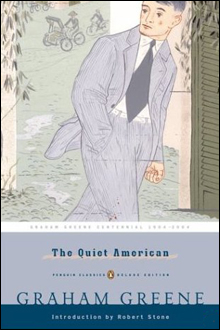
THE FIRST VIETNAM NOVEL: Greene's The Quiet American |
When I first saw Graham Greene, he was lunching outdoors with his longtime mistress at Chez Felix, Greene’s favorite restaurant in the old French port of Antibes. It was early October of last year and sunny, and he was wearing a long gray coat against a hint of autumn coolness.I knew he hadn’t been feeling well and I happened across him by coincidence —several hours in advance of our as-yet unconfirmed meeting — so I curbed my inclination to interrupt his meal with an aggressively friendly American hello. By now, after months of pursuing an interview, I’d learned that Greene valued his privacy. Although I’d always thought of him as a citizen of the world, as I spied him from a distance he looked very much the Englishman abroad, armed with a typically English shield of inaccessibility to ward off the casual intruder.
This chance encounter allowed me to view him in a way I could not, later on, in his apartment. I sat down on the lip of an old well about 30 yards away and observed the “great man” of 20th-century English letters. The first thing I noticed were his eyes, which seemed to be staring into a wide middle distance, absorbing everything. He looked his age, but his eyes somehow had the power of a much younger man.
It was, it turned out, the eve of his 86th birthday. I didn’t want to think it would be his last. Later, when he and his companion got up to go, they made their way slowly across the street. He couldn’t be that ill, I thought. But he was; he died a few months later, and I believe our conversation that night was his last interview.
It occurred to me that Greene had seen nearly all of the 20th century and could perhaps relate it to me in epic style. But I concluded that ascribing such powers to Greene would strike him as absurd and pretentious; this was a writer whose strict attention to the details of human existence has made him wary of the grand generalization and the overarching theory, even when the subject was God or his church.
As a writer, Greene had done virtually everything that could be done. His novels are universally acclaimed and brought him not only literary distinction but also the status of a sort of sinner’s theologian. Though he resisted religious categorization, he was easily the most important Catholic novelist of the century. That Greene never won the Nobel Prize for literature has always struck me as proof that Alfred Nobel’s original sin - the invention of dynamite - has permanently corrupted his memorial.
But Greene did far more than write good fiction. His travel book, Journey Without Maps, about his voyage on foot through Liberia in 1934, is a classic. As a journalist, he covered wars in south East Asia and Africa and interviewed such revolutionary figures as Fidel Castro, Ho Chi Minh, and Salvador Allende. He wrote plays, short stories, essays, and successful screenplays.
Greene was also famous for his politics and their seemingly contradictory nature. He flirted briefly with communism while a student at Oxford and actually worked as a small-time German agent in the French-occupied area of Germany after WWI. He was in the British Secret Service in WWII, but publicly remained friends with his former boss, Kim Philby, after this most famous of British traitors fled to the Soviet Union. He always professed sympathy for the victim in society - particularly in the Third World - but somehow managed to admire the French in Indochina, Fidel Castro, and General Omar Torrijos, the late dictator of Panama.
I say this because the pretext for our meeting was political, not literary, and although I’ve been an avid reader of his novels over the years, I wanted to know more about Greene the political figure - specifically, his reaction to the U.S. invasion of Panama.
“I was disgusted,” Greene told me, simply and finally.
We were seated in his small, book-lined living room four stories above the roar of Antibes traffic. I had come a way to find out what Greene had to say now about the tiny country he had adopted out of love for Torrijos. Greene was so taken with the charismatic dictator and his struggle to free Panama from US domination that he had written a memoir called Getting To Know the General, published in 1984, three years after Torrijos died in a plane crash.
I was facing Greene across a simple wooden coffee table. He lived so modestly in this three-room apartment that it was easy to forget his enormous commercial success. The furniture was comfortable, modern and plain, lacking even a suggestion of luxury.
I asked if he had spoken with anyone in Panama on December 20, 1989, the day of the US invasion.